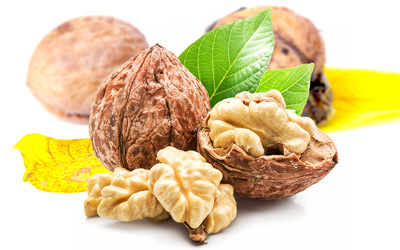People with type 2 diabetes are at least twice as likely to develop heart disease than those without diabetes.1 Endothelial dysfunction is associated with various conditions such as diabetes, high blood pressure, and atherosclerosis. Endothelial cells line blood vessels and play a role in maintaining vascular homeostasis.
As such, improving endothelial function and preventing associated vascular complications are the main strategies in diabetes management. Previous studies have shown that walnuts help improve endothelial function in adults with high cholesterol, but these effects have not yet been studied in diabetics.2,3
Consequently, researchers of this study aimed to determine the effects of daily walnut consumption on endothelial function and cardiovascular risk factors in adults with type 2 diabetes.
The Study
It was a randomized, controlled, single-blind, crossover trial conducted by researchers from the Prevention Research Center at Yale University School of Medicine, Derby, Connecticut. The results of this trial were published in the Diabetes Care journal of the American Diabetes Association.
The study recruited 24 men and women with type 2 diabetes, with an average age of 58. Participants were randomly assigned to two groups. Both groups were instructed to eat an ad libitum diet, which means eating based on one's satiety level without specific restrictions.
On top of that, the first group enriched their diet with 56 g of raw walnuts per day for eight weeks, followed by an 8-week washout period (no walnut consumption), and another eight weeks without eating walnuts.
The second group, on the other hand, started with eight weeks without walnuts, followed by an 8-week washout period, and then started eating eight weeks with 56 grams of walnuts daily added to their diet.
Endothelial function testing (flow-mediated dilation, FMD) and cardiovascular biomarker assessment were done before and at the completion of the study. Participants completed three 3-day diet records throughout the study.
The Results
The results of the flow-mediated dilation technique substantially improved in the walnut group in comparison to the control group.
After eight weeks, participants in the walnut group showed increased fasting serum glucose as well as reduced serum total cholesterol and LDL cholesterol. The improvements did not reach statistical significance relative to the non-walnut group.
There were no significant changes in other tested markers, including anthropometric measures, plasma A1C, and insulin sensitivity.
Walnut consumption was not associated with an increase in body mass index (BMI), body weight, or waist circumference.
What Does this Mean?
Consistent with the findings of several other studies, this trial provides additional evidence that a diet enriched with walnuts can improve endothelial function in people with type 2 diabetes. By doing so, the walnuts may reduce cardiovascular risks related to diabetes.
Walnut consumption has also been shown not to cause weight gain, which is an important finding since dietary and lifestyle modifications can be a powerful tool in management of diabetes and associated health risks. These results offer quality data to validate the addition of walnuts to a daily diabetic diet.
Other herbs that may benefit diabetics include ginger, goldenberries, and cinnamon.
Sources
- Diabetes Care, Effects of Walnut Consumption on Endothelial Function in Type 2 Diabetic Subjects, 2010
- Biochimica et Biophysica Acta. (2013). Endothelial dysfunction – A major mediator of diabetic vascular disease. Retrieved September 24, 2020 from https://www.sciencedirect.com/science/article/pii/S0925443913002718
Footnotes:
- Center of Disease Control and Prevention. (2020). Diabetes and Your Heart. Retrieved September 24, 2020 from https://www.cdc.gov/diabetes/library/features/diabetes-and-heart.html
- Circulation. (2004). A walnut diet improves endothelial function in hypercholesterolemic subjects: a randomized crossover trial. Retrieved September 24, 2020 from https://pubmed.ncbi.nlm.nih.gov/15037535/
- Journal of the American College of Cardiology. (2006). Acute effects of high-fat meals enriched with walnuts or olive oil on postprandial endothelial function. Retrieved September 24, 2020 from https://pubmed.ncbi.nlm.nih.gov/17045905/





